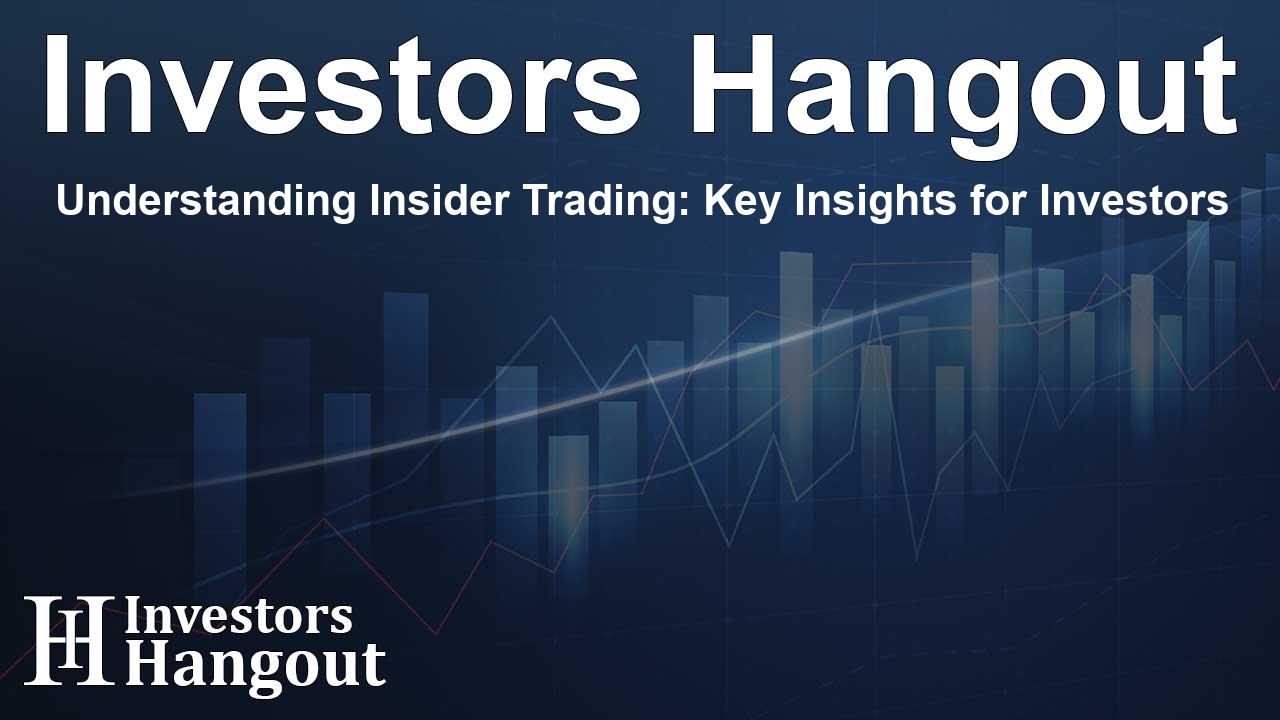Understanding Insider Trading: Key Insights for Investors

Understanding the Impact of Insider Trading on Investments
Insider trading is a crucial aspect of the financial markets that can provide valuable insights into a company's potential. It involves the buying and selling of a company's stock by individuals who have access to non-public information, typically company executives, directors, and employees. Their actions can serve as indicators of how those with the most knowledge perceive the future prospects of the company.
Why Track Insider Activity?
Staying informed about insider trading activities can enhance an investor's understanding of market dynamics. Insiders generally have first-hand knowledge about the company's operations, business strategies, and upcoming challenges, thus their trading activities can be seen as an indicator of the company's financial health and future performance.
Value of Insider Buying
When insiders buy shares of their own company, it often signifies confidence in the company's future. Such purchases can be driven by various factors, including upcoming projects or an anticipated uptick in revenues. Investors may view these transactions as a bullish signal, potentially leading them to explore further investments in the stock.
Risks Associated with Insider Selling
Conversely, insider selling activities might raise flags for potential investors. If major stakeholders begin to sell their shares, it can suggest they anticipate challenges ahead. However, it is important to note that not all selling is pessimistic; insiders might sell stocks for legitimate reasons, such as personal financial planning or diversification.
Cross-Analyzing Insider Trades with Market Trends
To fully understand the implications of insider trading, investors should cross-reference these activities with other market analyses. Combining insider transactions with technical indicators and fundamental data allows for a more comprehensive view of the stock’s viability. Tracking patterns in insider trading alongside market performance can reveal trends that might go unnoticed if viewed in isolation.
Current Market Trends
Recent market fluctuations have highlighted the importance of being vigilant regarding insider activities. As economic conditions evolve, companies may face new opportunities and challenges. Staying updated with how insiders react to these changes can help investors make better strategic decisions.
Tools for Monitoring Insider Trading
Various tools and platforms now exist that enable investors to monitor insider transactions efficiently. These resources compile data and present it in user-friendly formats, allowing investors to keep track of when and how much insiders are buying or selling. By utilizing these tools, investors can make more informed decisions and enhance their trading strategies.
Final Thoughts on Insider Trading
In conclusion, while trading activities by insiders should not be the sole influence on investment decisions, they can provide significant insights. Understanding the rationale behind these trades can empower investors and inform their strategies. By staying educated about insider activity and integrating this information into broader analyses, investors can better navigate the complexities of the market.
Frequently Asked Questions
What is insider trading?
Insider trading refers to the buying or selling of a company's stock by individuals with non-public information about the company. It can either be legal or illegal, depending on the circumstances.
How can insider trading influence stock prices?
Insider trading can affect stock prices as it typically reflects the insiders’ confidence or concerns about the company's future performance. Significant buying can lead to increased prices, while selling can lead to declines.
Where can I track insider trading information?
Investors can monitor insider trading through various financial news platforms and specialized websites that provide data and analysis on insider transactions.
Should I make investment decisions purely based on insider trading activity?
While insider trading can provide valuable insights, it should never be the sole factor in investment decisions. It is crucial to analyze it in conjunction with other financial metrics and market trends.
What should I consider when evaluating insider selling?
It's important to assess the context behind insider selling. Not all selling is negative; insiders might need to liquidate shares for personal reasons. Look for patterns and combine this information with the overall market climate.
About Investors Hangout
Investors Hangout is a leading online stock forum for financial discussion and learning, offering a wide range of free tools and resources. It draws in traders of all levels, who exchange market knowledge, investigate trading tactics, and keep an eye on industry developments in real time. Featuring financial articles, stock message boards, quotes, charts, company profiles, and live news updates. Through cooperative learning and a wealth of informational resources, it helps users from novices creating their first portfolios to experts honing their techniques. Join Investors Hangout today: https://investorshangout.com/
Disclaimer: The content of this article is solely for general informational purposes only; it does not represent legal, financial, or investment advice. Investors Hangout does not offer financial advice; the author is not a licensed financial advisor. Consult a qualified advisor before making any financial or investment decisions based on this article. The author's interpretation of publicly available data shapes the opinions presented here; as a result, they should not be taken as advice to purchase, sell, or hold any securities mentioned or any other investments. The author does not guarantee the accuracy, completeness, or timeliness of any material, providing it "as is." Information and market conditions may change; past performance is not indicative of future outcomes. If any of the material offered here is inaccurate, please contact us for corrections.